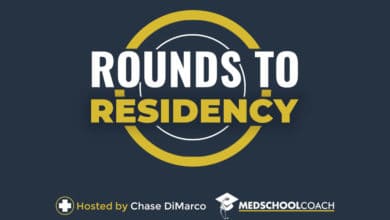Dr. Greg Rodden, a second-year pediatric resident in Austin, Texas, talks about how to transition into residency, planning and choosing a rotation, and the intricacies of work-life balance during clinical rotation.
- [06:07] How to transition from med school into residency
- [09:20] Preparing for rotations
- [14:23] How to plan and choose a rotation
- [17:01] Gaining the most out of a rotation
- [21:37] Perfecting work-life balance during clinical rotations
How to Transition from Medical School into Residency
Preparing for your Step exams can be a daunting task. You want to put your best foot forward while thinking about your future patients. Although you might not apply all this accumulated knowledge in your future area of expertise, it always pays to have a strong foundation of knowledge moving forward. The good news is that once you’re done with the exams and are practically waiting for a match, you’ll have a lot of time to do all the other things you’re passionate about. Dr. Rodden believes that you should make the most out of this period because residency will be tough.
Preparing for Rotations
You certainly know that you’ll need to spend a specific amount of time on rotation, and you’ll also need to be prepared before checking in. Dr. Rodden believes investing time in bettering yourself before clinical rotations will help you prepare psychologically and knowledge-wise. A good example of how to do this is by taking part in online medical boot camps.
How to Plan and Choose a Rotation
Generally, there is a centralized process to apply for clinical rotations. However, some of these specialties are often highly competitive; thus, hospitals can only take in a specific number of students. That is not to mean that you should give up. Some hospitals don’t go through these processes and advertise their open positions through their website. If you stumble upon something you find interesting, inquire if they accept visiting students.
Gaining the Most Out of a Rotation
Once you start your rotation journey, you need to understand that sometimes these rotations can be an audition of some sort. Always put your best foot forward and be the best version of yourself you possibly can. Nonetheless, you need to understand that not everything goes according to plan, and there will be times when things will unexpectedly crumble. Never let that crush your spirit because as long as you’re confident in your abilities, everything will work out fine.
Perfecting Work-Life Balance During Clinical Rotations
Your third and fourth years in school should be spent developing interests both in and out of medicine. Sadly, most students tend to neglect their personal lives, choosing to spend most of their time deep in books. This is understandable, but it’s worthwhile if you spent time cultivating your other passions outside of medicine. If you’re in a relationship, for example, always make time for your partner. Something as simple as a dinner date once a week can go a long way in cementing your relationship.
Check out the Online MedEd Intern Boot Camp.
Sign up for a Free Coaching session with Chase DiMarco, sponsored by Prospective Doctor! You can also join the Med Mnemonist Mastermind FB Group today and learn more about study methods, memory techniques, and MORE! Do check out Read This Before Medical School. Like our FreeMedEd Facebook page and find our Medical Micro Course, Blog posts, and Podcasts at FreeMedEd.org! Feel free to Email any Questions or Comments.
